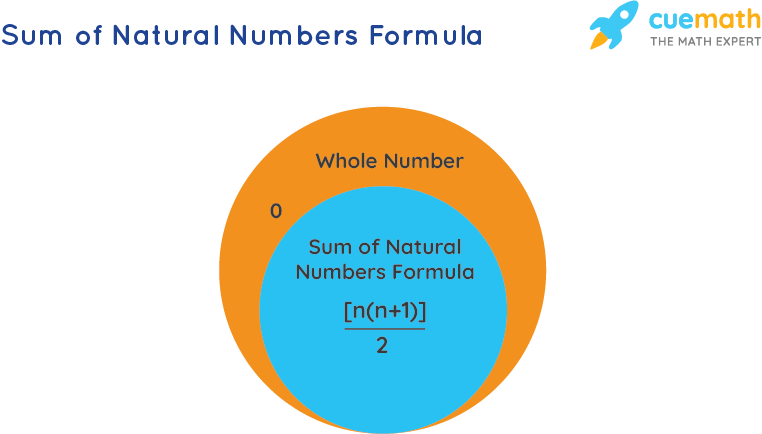Sum of n Natural Numbers Formula
The sum of natural numbers formula is obtained by using the arithmetic progression formula where the common difference between the preceding and succeeding numbers is 1. Natural numbers are also called counting numbers start from the number 1 until infinity such as 1,2,3,4,5,6,7, and so on. Let us learn about the sum of n natural numbers, how the formula is derived, and solve a few examples.

What is the Sum of Natural Numbers Formula?
The sum of n natural numbers formula is used to find 1 + 2 + 3 + 4 +..... up to n terms. This is arranged in an arithmetic sequence. Hence we use the formula of the sum of n terms in the arithmetic progression for deriving the formula for the sum of natural numbers.
Sum of Natural Numbers Formula: \(\sum_{1}^{n}\) = [n(n+1)]/2, where n is the natural number.
Definition of Sum of n Natural Numbers
Sum of n natural numbers can be defined as a form of arithmetic progression where the sum of n terms are arranged in a sequence with the first term being 1, n being the number of terms along with the nth term. The sum of n natural numbers is represented as [n(n+1)]/2. Natural numbers are the numbers that start from 1 and end at infinity. Natural numbers include whole numbers in them except the number 0.
Derivation of Sum of Natural Numbers Formula
Let us derive the sum of natural numbers using the sum of n terms in an AP. In an AP, 'a' is the first term, 'd' is a common difference, 'l' is the last term i.e. nth term, l = a+(n-1)d
In the arithmetic sequence of natural numbers, the common difference between the numbers is 1.
The sum of n terms of arithmetic progression will be:
Sum = a + (a+d) + (a+2d) …… + (l-2d) + (l-d) + l——————– (1)
When the order is reversed, the sum remains the same, hence,
Sum = l+(l-d)+(l-2d)..…+(a+2d)+(a+d)+a——————- (2)
Adding equations 1 and 2, we get
2 × Sum = (a+l)+[(a+d)+(l-d)]………+[(l-d)+(a+d)]+(l+a)]
2× Sum = (a+l)+(a+l)………+(a+l)+(a+l)
2 × Sum = n×(a+l)
⇒ Sum = n/2(a+l)
Substituting the value of l from the previous equation, we get
Sum of n terms of arithmetic progression = n/2[2a + (n – 1)d]
For natural numbers, a = 1 and d = 1, therefore,
S = n/2[2×1+(n-1)1]
S = [n(n+1)]/2
Hence, Sum of natural numbers formula = [n(n+1)]/2

Examples on Sum of Natural Numbers Formula
Example 1: Find the sum of the first 35 natural numbers.
Solution: Given, n = 35
The sum of natural numbers formula is:
S = [n(n+1)]/2
S = [35(35+1)]/2
S = 630
Therefore, the sum of the first 35 natural numbers is 630
Example 2: Find the sum of the natural numbers from 1 to 100.
Solution: We can use the arithmetic progression formula to find the sum of the natural numbers from 1 to 100. Where a = 1, n = 100, and d = 1
Sum of n terms of arithmetic progression = n/2[2a + (n – 1)d]
S = 100/2[2×1 + (100 - 1)1]
S = 5050
Therefore, the sum of the natural numbers from 1 to 100 is 5050
Example 3: Find the sum of the first 5 natural numbers.
Solution: Given, n = 5
Using the sum of natural numbers formula we get,
Sum of Natural Numbers Formula = [n(n+1)]/2
S = 5(5+1)/2
S = 15
Therefore, the sum of the first 5 natural numbers is 15
FAQs on Sum of Natural Numbers Formula
What is Meant by Sum of n Natural Numbers Formula?
The sum of natural numbers formula is used to find the sum of the natural numbers up to n terms. i.e., 1 + 2 + 3 + 4 + 5 + .... up to n terms. To derive the formula, we need to use the sum of the arithmetic progression formula, because the natural numbers are arranged in an arithmetic sequence. With 1 as the first term, 1 as the common difference, and up to n terms, we use the sum of an AP = n/2(2+(n-1)). Solving this, we get the sum of natural numbers formula = [n(n+1)]/2
What is the Formula of Sum of n Natural Numbers?
The sum of natural numbers is derived with the help of arithmetic progression. Hence, the formula is
Sum of Natural Numbers Formula = [n(n+1)]/2
where n is the natural number.
What is the Formula for the Sum of the First n Even Natural Numbers?
The sum of the first n even natural number formula is n(n + 1). Here is how we derived at it:
n is even natural numbers that are 2,4,6,………., 2n which forms an arithmetic progression. Here, a = 2, d = 4 - 2 = 2
By using the arithmetic progression formula ,we get, Sn = n/2 [2a + (n – 1) d]
Sn = n/2 [2(2) + (n -1) 2]
Sn = n/2 [4 + 2n – 2]
Sn = n/2 × 2 [2 + n – 1]
Sn = n (n + 1)
Hence, Sum of Even Natural Numbers is n(n + 1)
What is the Sum of the First 29 Natural Numbers by Using the Formula?
The sum of the natural number formula = [n(n+1)]/2
S = 29(29+1)/2
S = 435
Hence, the sum of the first 29 natural numbers is 435.
How Do You Find the Sum of n Natural Numbers?
The sum of n natural numbers can be derived by using the formula,
Sum of Natural Numbers Formula = [n(n+1)]/2
How to Find the Sum of Natural Numbers 1 to 100?
The sum of all natural numbers from 1 to 100 is 5050 where the total number of natural numbers in this range is 100.
visual curriculum
